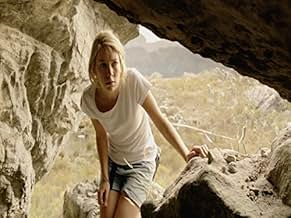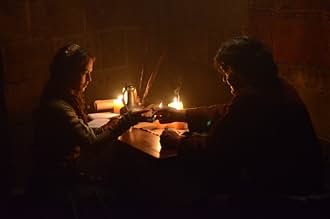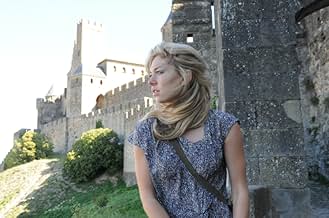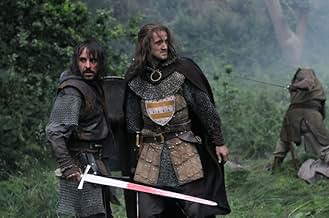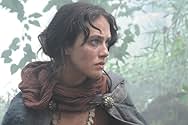On y suit le parcours de deux femmes à différentes époques, toutes deux à la recherche du Saint Graal.On y suit le parcours de deux femmes à différentes époques, toutes deux à la recherche du Saint Graal.On y suit le parcours de deux femmes à différentes époques, toutes deux à la recherche du Saint Graal.
Parcourir les épisodes
Avis à la une
A TV miniseries adaptation of the Kate Mosse novel LABYRINTH. I made a point of reading the book before watching this, and I found out that I didn't think very much of it at all. The miniseries would be an improvement, right? Well, it is, but it's certainly not a "great" piece of entertainment, saddled as it is with various flaws and contradictions.
The good news is that although it follows the same basic plotting as the novel, pretty much every scene and sequence is changed slightly, enhanced to be more entertaining for TV audiences. Thus it's also a lot more explicit, with some bloodshed and nudity thrown in for adult viewers.
It's better than the book because it doesn't drag so much, preferring to get on with the narrative instead of throwing in the three-pages of travelogue stuff that lets Mosse's writing down. The enhanced levels of violence make this hard-hitting in places, but the calibre of the acting is a disappointment. Some of the established supporting actors are okay - John Hurt, Tom Curran, even Tom Felton in a Orlando-Bloom-in-Kingdom-of-Heaven type role, but the leads are weak, particularly Vanessa Kirby. Who ever thought she'd be experienced enough to carry the central role?
There are still problems with the story, namely the sub-DA VINCI CODE antics of the modern-day tale (which could have been removed completely), although the historical stuff is more interesting. Some of the direction is also a little cheesy, especially when it descends into sub-Shakespeare melodrama at the climax. Still, I suspect those unfamiliar with the story will enjoy it more than I did...
The good news is that although it follows the same basic plotting as the novel, pretty much every scene and sequence is changed slightly, enhanced to be more entertaining for TV audiences. Thus it's also a lot more explicit, with some bloodshed and nudity thrown in for adult viewers.
It's better than the book because it doesn't drag so much, preferring to get on with the narrative instead of throwing in the three-pages of travelogue stuff that lets Mosse's writing down. The enhanced levels of violence make this hard-hitting in places, but the calibre of the acting is a disappointment. Some of the established supporting actors are okay - John Hurt, Tom Curran, even Tom Felton in a Orlando-Bloom-in-Kingdom-of-Heaven type role, but the leads are weak, particularly Vanessa Kirby. Who ever thought she'd be experienced enough to carry the central role?
There are still problems with the story, namely the sub-DA VINCI CODE antics of the modern-day tale (which could have been removed completely), although the historical stuff is more interesting. Some of the direction is also a little cheesy, especially when it descends into sub-Shakespeare melodrama at the climax. Still, I suspect those unfamiliar with the story will enjoy it more than I did...
The miniseries deals with two women , modern-day Alice Tanner (Vanessa Kirby) , a volunteer at a French archaeological excavation who finds the skeletal remains of two people in a cave , and medieval Alaïs Pelletier Du Mas (Jessica Findlay) , who lives through the Crusades and Cathar slaughters in medieval France , both of them are seeking the Holy Grail . As there are three sacred books that reveal the secret of the Holy Grail from the Crusaders and various tracks as a labyrinth-engraved ring that lead to resolve the enigmas . In 1209, newly married Alaïs to Guilhem Du Mas is living in Carcassonne , a stronghold of Cathars defended by Viscount Trencavel (Tom Felton). Meanwhile , it is besieged by Simon Monfort (John Lynch) and Guy D'Evreux (Tony Curran) leaders of the Crusaders . Hunted by the Inquisition and deserted by the nobles of their districts, the Cathars became more and more scattered fugitives : meeting surreptitiously in woods and mountain wilds .
This is an epic film mingling actual events along with past happenings by means of a lot of flashbacks ; as while in contemporary time occurs an intrigue starred by Vanessa Kirby , in Middle Age when the city of Carcassona has been declared heretical by the Church being starred by Jessica Findlay , and his nasty sister Katie McGrath . The most interesting moments concern about the historic events dealing with Catharism , a movement that thrived in some areas of Europe , particularly southern France, between the 12th and 14th centuries , the followers were known as Cathars and are now mainly remembered for a prolonged period of persecution , it appeared in Europe in the Languedoc region of France , as here are shown impressive battles and strong massacres , they are the highlights of the movie . Acceptable mini-series , though sometimes result to be pointless , non-sense , and confuse . Based on the bestseller by Kate Mosse who plays a small role as Montsegur Guide . The picture was professionally directed by Christopher Smith , though it has some flaws and gaps .
This one being based on historic facts as : Pope Innocent III attempted to end Catharism by sending missionaries and by persuading the local authorities to act against them . In 1208 Innocent's papal legate Pierre Castelnau was murdered while returning to Rome after excommunicating Count Raymond VI of Toulouse . Pope Innocent III then abandoned the option of sending Catholic missionaries , launched the Albigensian Crusade which all but ended Catharism . The crusader army came under the command, both spiritually and militarily, of the papal legate Arnaud-Amaury. In the first significant engagement of the war, the town of Béziers was besieged . The Catholic inhabitants of the city were granted the freedom to leave unharmed, but many refused and opted to stay alongside the Cathars. Their first target was the lands of the Trencavel, powerful lords of Albi, Carcassonne and the Razes—but a family with few allies in the Midi. Little was thus done to form a regional coalition and the crusading army was able to take Carcassonne, the Trencavel capital, incarcerating Raymond Roger Trencavel in his own citadel where he died , allegedly of natural causes; champions of the Occitan cause from that day to this believe he was murdered . Simon de Montfort was granted the Trencavel lands by the Pope and did homage for them to the King of France, thus incurring the enmity of Peter II of Aragon who had held aloof from the conflict, even acting as a mediator at the time of the siege of Carcassonne. The remainder of the first of the two Cathar wars now essentially focused on Simon's attempt to hold on to his fabulous gains through winters where he was faced, with only a small force of confederates operating from the main winter camp at Fanjeaux, with the desertion of local lords who had sworn fealty to him out of necessity—and attempts to enlarge his newfound domains in the summer when his forces were greatly augmented by reinforcements from northern France, Germany and elsewhere. Summer campaigns saw him not only retake, sometimes with brutal reprisals, what he had lost in the 'close' season, but also seek to widen his sphere of operation—and we see him in action in the Aveyron at St. Antonin and on the banks of the Rhone at Beaucaire. Simon's greatest triumph was the victory against superior numbers at the Battle of Muret—a battle which saw not only the defeat of Raymond of Toulouse and his Occitan allies—but also the death of Peter of Aragon—and the effective end of the ambitions of the house of Aragon/Barcelona in the Languedoc . The Battle of Muret was a massive step in the creation of the unified French kingdom and the country we know today—although Edward III, the Black Prince and Henry V would threaten later to shake these foundations. The Cathars spent much of 1209 fending off the crusaders. The Béziers army attempted a sortie but was quickly defeated, then pursued by the crusaders back through the gates and into the city. The doors of the church of St Mary Magdalene were broken down and the refugees dragged out and slaughtered. Prisoners were blinded, dragged behind horses, and used for target practice. What remained of the city was razed by fire. After the success of his siege of Carcassonne, which followed the Massacre at Béziers in 1209, Simon de Montfort was designated as leader of the Crusader army. Prominent opponents of the Crusaders were Raymond Roger Trencavel, viscount of Carcassonne, and his feudal overlord Peter II, the king of Aragon, who held fiefdoms and had a number of vassals in the region. Peter died fighting against the crusade on 12 September 1213 at the Battle of Muret. Simon Montfort was killed on 25 June 1218 after maintaining a siege of Toulouse for nine months .
This is an epic film mingling actual events along with past happenings by means of a lot of flashbacks ; as while in contemporary time occurs an intrigue starred by Vanessa Kirby , in Middle Age when the city of Carcassona has been declared heretical by the Church being starred by Jessica Findlay , and his nasty sister Katie McGrath . The most interesting moments concern about the historic events dealing with Catharism , a movement that thrived in some areas of Europe , particularly southern France, between the 12th and 14th centuries , the followers were known as Cathars and are now mainly remembered for a prolonged period of persecution , it appeared in Europe in the Languedoc region of France , as here are shown impressive battles and strong massacres , they are the highlights of the movie . Acceptable mini-series , though sometimes result to be pointless , non-sense , and confuse . Based on the bestseller by Kate Mosse who plays a small role as Montsegur Guide . The picture was professionally directed by Christopher Smith , though it has some flaws and gaps .
This one being based on historic facts as : Pope Innocent III attempted to end Catharism by sending missionaries and by persuading the local authorities to act against them . In 1208 Innocent's papal legate Pierre Castelnau was murdered while returning to Rome after excommunicating Count Raymond VI of Toulouse . Pope Innocent III then abandoned the option of sending Catholic missionaries , launched the Albigensian Crusade which all but ended Catharism . The crusader army came under the command, both spiritually and militarily, of the papal legate Arnaud-Amaury. In the first significant engagement of the war, the town of Béziers was besieged . The Catholic inhabitants of the city were granted the freedom to leave unharmed, but many refused and opted to stay alongside the Cathars. Their first target was the lands of the Trencavel, powerful lords of Albi, Carcassonne and the Razes—but a family with few allies in the Midi. Little was thus done to form a regional coalition and the crusading army was able to take Carcassonne, the Trencavel capital, incarcerating Raymond Roger Trencavel in his own citadel where he died , allegedly of natural causes; champions of the Occitan cause from that day to this believe he was murdered . Simon de Montfort was granted the Trencavel lands by the Pope and did homage for them to the King of France, thus incurring the enmity of Peter II of Aragon who had held aloof from the conflict, even acting as a mediator at the time of the siege of Carcassonne. The remainder of the first of the two Cathar wars now essentially focused on Simon's attempt to hold on to his fabulous gains through winters where he was faced, with only a small force of confederates operating from the main winter camp at Fanjeaux, with the desertion of local lords who had sworn fealty to him out of necessity—and attempts to enlarge his newfound domains in the summer when his forces were greatly augmented by reinforcements from northern France, Germany and elsewhere. Summer campaigns saw him not only retake, sometimes with brutal reprisals, what he had lost in the 'close' season, but also seek to widen his sphere of operation—and we see him in action in the Aveyron at St. Antonin and on the banks of the Rhone at Beaucaire. Simon's greatest triumph was the victory against superior numbers at the Battle of Muret—a battle which saw not only the defeat of Raymond of Toulouse and his Occitan allies—but also the death of Peter of Aragon—and the effective end of the ambitions of the house of Aragon/Barcelona in the Languedoc . The Battle of Muret was a massive step in the creation of the unified French kingdom and the country we know today—although Edward III, the Black Prince and Henry V would threaten later to shake these foundations. The Cathars spent much of 1209 fending off the crusaders. The Béziers army attempted a sortie but was quickly defeated, then pursued by the crusaders back through the gates and into the city. The doors of the church of St Mary Magdalene were broken down and the refugees dragged out and slaughtered. Prisoners were blinded, dragged behind horses, and used for target practice. What remained of the city was razed by fire. After the success of his siege of Carcassonne, which followed the Massacre at Béziers in 1209, Simon de Montfort was designated as leader of the Crusader army. Prominent opponents of the Crusaders were Raymond Roger Trencavel, viscount of Carcassonne, and his feudal overlord Peter II, the king of Aragon, who held fiefdoms and had a number of vassals in the region. Peter died fighting against the crusade on 12 September 1213 at the Battle of Muret. Simon Montfort was killed on 25 June 1218 after maintaining a siege of Toulouse for nine months .
It's quite possible that the low reviews for this series are influenced by its religious themes. Yet the producers must have been aware of the risk. Religion can be a polarizing subject. Any misstep-real or perceived-could lead to backlash.
However, I see the religious elements as metaphors, similar to how the shark in Jaws represented more than just a predator. This series, like Jaws, is ultimately about human experience. Themes of fear, guilt, redemption, and existential questioning resonate on multiple levels. When viewed this way, the characters' struggles feel more real and profound.
I give the series a 6.5 not only for the engaging characters, but also for the courage shown by the series creators.
However, I see the religious elements as metaphors, similar to how the shark in Jaws represented more than just a predator. This series, like Jaws, is ultimately about human experience. Themes of fear, guilt, redemption, and existential questioning resonate on multiple levels. When viewed this way, the characters' struggles feel more real and profound.
I give the series a 6.5 not only for the engaging characters, but also for the courage shown by the series creators.
My wife had read the book and while she said it wasn't one of the author's best, it was good enough, so I gave this a go. I've found that sometimes weaker books from an author make better films than stronger ones, and while I was a little dubious of the subject matter, I thought I'd give it a go anyway.
What I got was a heap of fairly risible trash, with phoned in performances, some remarkably passionless bonking, a retread of the familiar "It's all a Catholic plot!" Grail stuff, and a curiously strong desire to persecute Cathars. Not on religious grounds, mind you, just for being annoying. It's a pain when you're several hundred years too late to join in the fun :(. I'm just rather disappointed, overall. It's full of actors that I like, so I disregarded the rather uncomplimentary heads-up from the Radio Times and plowed on with it, only to come out at the end with, well, nothing.
What I got was a heap of fairly risible trash, with phoned in performances, some remarkably passionless bonking, a retread of the familiar "It's all a Catholic plot!" Grail stuff, and a curiously strong desire to persecute Cathars. Not on religious grounds, mind you, just for being annoying. It's a pain when you're several hundred years too late to join in the fun :(. I'm just rather disappointed, overall. It's full of actors that I like, so I disregarded the rather uncomplimentary heads-up from the Radio Times and plowed on with it, only to come out at the end with, well, nothing.
Somber. Poignant. Thought Provoking. I was thinking about the film and its implications long after it was over. It echoes so many repeated events in history of committing acts of violence, all in the name of religion. The crusading party proclaiming itself morally correct and never guilty. To be honest, I never knew about the Cathars and their fate until I watched this miniseries. It really got me interested in learning more about them.
So much criticism from other people and low ratings because the feature was dark and portrayed a harsh reality of a very dark aspect of Christianity. I felt compelled to chime in with the minority of viewers who liked this feature. The film neither revels nor vilifies the darkness and violence of the antagonists. Instead it gives a realistic portrayal of historical events as much as we can know them. This is especially true during the Medieval ages. It was a time rife with examples of religions committing heinous and cruel acts of violence against "non-believers", all in the name of God and Christianity. There are plenty of examples from history where many were converted to Christianity under duress through acts of violence, at a sword point, hanging, beheading, etc. The film takes great care not to go overboard with either the victims or villains portrayal and paints a very haunting picture of medieval France and the Crusades and the Cathar massacres.
The acting was very good across the board for the Medieval portion of the story (with some minor exceptions). Tom Felton as Viscount Trencavel delivered an especially passionate and spirited performance as a noble and charismatic leader of Carcassonne. Jessica Brown Findlay as medieval Alaïs Pelletier du Mas and Emun Elliott as her husband, Guilhem Du Mas brought a very evocative performance as well, making the ending of the story that much more powerful and tragic.
The beautiful soundtrack, scenery and landscapes, believable settings, good costuming along with strong performances all contributed to an engrossing story. Though occasionally slow, the thick as tar tension, atmosphere and believable acting keep the story moving forward and viewers invested in the events and characters.
Perhaps my only one but big complaint was the back and forth switching between medieval and modern times. It was distracting at times, and I did not feel the 2012 events connected well with the past. Some plot points felt contrite and forced to fit the events of 1209 Carcassonne. The whole modern time arch felt just thrown together, not nearly as interesting, and realistic as the past. As if instinctively sensing that the 2012 events really didn't belong in the series, the scriptwriter's and actors' performances and the characters' stories were uninspiring and not nearly as compelling and believable. The modern part of the story did not connect well with the medieval part and was too disjointed to be its own separate story. I just found it too hard to care for its characters. I wish they had focused exclusively on Cathars of medieval Carcassonne. It was a fascinating story, albeit a tragic one, that deserves more coverage.
If you have an interest in history in general or consider yourself a history savant, then grab a cup of soothing chamomile tea and watch the miniseries. I am giving this film a high rating solely based on the strength of the medieval story.
So much criticism from other people and low ratings because the feature was dark and portrayed a harsh reality of a very dark aspect of Christianity. I felt compelled to chime in with the minority of viewers who liked this feature. The film neither revels nor vilifies the darkness and violence of the antagonists. Instead it gives a realistic portrayal of historical events as much as we can know them. This is especially true during the Medieval ages. It was a time rife with examples of religions committing heinous and cruel acts of violence against "non-believers", all in the name of God and Christianity. There are plenty of examples from history where many were converted to Christianity under duress through acts of violence, at a sword point, hanging, beheading, etc. The film takes great care not to go overboard with either the victims or villains portrayal and paints a very haunting picture of medieval France and the Crusades and the Cathar massacres.
The acting was very good across the board for the Medieval portion of the story (with some minor exceptions). Tom Felton as Viscount Trencavel delivered an especially passionate and spirited performance as a noble and charismatic leader of Carcassonne. Jessica Brown Findlay as medieval Alaïs Pelletier du Mas and Emun Elliott as her husband, Guilhem Du Mas brought a very evocative performance as well, making the ending of the story that much more powerful and tragic.
The beautiful soundtrack, scenery and landscapes, believable settings, good costuming along with strong performances all contributed to an engrossing story. Though occasionally slow, the thick as tar tension, atmosphere and believable acting keep the story moving forward and viewers invested in the events and characters.
Perhaps my only one but big complaint was the back and forth switching between medieval and modern times. It was distracting at times, and I did not feel the 2012 events connected well with the past. Some plot points felt contrite and forced to fit the events of 1209 Carcassonne. The whole modern time arch felt just thrown together, not nearly as interesting, and realistic as the past. As if instinctively sensing that the 2012 events really didn't belong in the series, the scriptwriter's and actors' performances and the characters' stories were uninspiring and not nearly as compelling and believable. The modern part of the story did not connect well with the medieval part and was too disjointed to be its own separate story. I just found it too hard to care for its characters. I wish they had focused exclusively on Cathars of medieval Carcassonne. It was a fascinating story, albeit a tragic one, that deserves more coverage.
If you have an interest in history in general or consider yourself a history savant, then grab a cup of soothing chamomile tea and watch the miniseries. I am giving this film a high rating solely based on the strength of the medieval story.
Le saviez-vous
- AnecdotesIn episode 2, Kate Mosse, the author of the book on which the mini-series is based, makes a cameo as a tour guide.
Meilleurs choix
Connectez-vous pour évaluer et suivre la liste de favoris afin de recevoir des recommandations personnalisées
- How many seasons does Labyrinth have?Alimenté par Alexa
Détails
- Date de sortie
- Pays d’origine
- Langue
- Aussi connu sous le nom de
- Kate Mosse's Labyrinth
- Lieux de tournage
- Sociétés de production
- Voir plus de crédits d'entreprise sur IMDbPro
Contribuer à cette page
Suggérer une modification ou ajouter du contenu manquant


